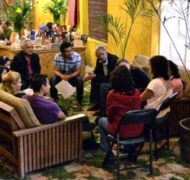Ruth and Parables: Small Group Leaders Guide Week 6
Small Group Study / Produced by Individual TOW Project member
This content is part of the Ruth and Parables curriculum, an 11-week integrated sermon and small group series on faith and work.
Read Ruth 2:17-23
Topic 1 – You have an inner need to work/your household needs you to do your share
According to the sermon, “The urge to work is built into us because we are created in the image of God, and God is a worker. It would be a terrible cruelty if God created us with an inner need to work, but nothing meaningful to do.
“Thank God, the world needs your work. The world that God created is incomplete, unfinished, potential, you have something that the world needs. The universe cannot be what God means it to be—not even nature can be what God means it to be—without human work.”
Questions
- Is it really true that you have an inner need to work? A lot of our systems assume that people don’t want to work and have to be monitored, incentivized, or forced to work. Isn’t work something you try to get finished with as little time and effort as possible, so you can get on to something more fun or meaningful? What’s your experience?
- Does the world really need your work? Didn’t the universe get along fine for 13.5 billion years without human work? God is all-powerful. How can we say that God needs human work to complete the world’s unfinished potential? What does your particular work contribute that is meaningful in the grand scheme of things?
- Does this mean that people who have disabilities, health problems, unemployment, or other situations that prevent them from doing work are created less in the image of God? “Children of a Lesser God,” as the famous book title about deafness put it?
Topic 2 – Investing in others’ work is the best way to use your own capabilities
From the sermon: “We found four ways that providing the opportunity to work is better than giving people stuff:
- Maintains work skills, conditioning, habits.
- Promotes self-respect; maintains dignity.
- Prevents dependency.
- Obviates forced labor and exploitation.”
Questions
- Is investing in others’ work really better than providing for others’ needs directly? Or is this just a justification for rich people who don’t want to give their wealth or pay higher taxes?
- Who has invested in your work over the years? Did it really make a difference? Did it benefit you in the four ways from the sermon, or in other ways?
- What are some ways you could invest in others’ work in your workplace?
Read Mark 4:3-9
Topic 3 – Your work is God’s gift to you, not your gift to God
From the sermon: “Whether it’s doing your share to provide your own needs or whether it’s investing in the work of others, whatever you have to offer comes from God, not from trying harder. Jesus said, ‘My yoke is easy, and my burden is light.’ If God is the sower, then all you have to be is the soil. You don’t have to make the seed grow, you don’t have to try harder, you just have to be dirt.
Questions
- The sermon said that investing is others’ work is much harder than doing the work yourself. So how can you actually do anything to invest in others’ work without trying harder? Whatever you do is going to take effort.
- If my work is God’s gift to me, not my gift to God, doesn’t that mean I’m off the hook for excellence, productivity, getting my work done, accountability? What if everyone thought this way? Would there be no Beethoven, no Steve Jobs, no Abraham Lincoln?
- Right now God isn’t giving me any work. (Or, the work I have right now is crappy). Does this mean God is punishing me? Ignoring me? Doesn’t care about me? Am I bad dirt?
- Is thanking God for whatever work you have today really the key to having something meaningful to offer the world? Do you have any experience in this are? How did it turn out?











